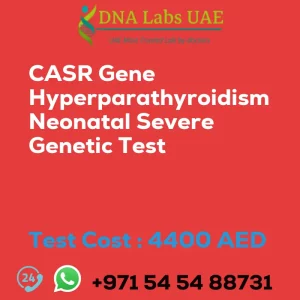CLCN5 Gene Hypophosphatemic Rickets Genetic Test
At DNA Labs UAE, we offer the CLCN5 Gene Hypophosphatemic Rickets Genetic Test. This test helps in the diagnosis and identification of mutations in the CLCN5 gene, which is responsible for the production of chloride channel 5 in the kidneys.
Test Details
Hypophosphatemic rickets is a rare genetic disorder characterized by low levels of phosphate in the blood, resulting in impaired mineralization of bones and teeth. Common symptoms of this condition include bone pain, skeletal deformities, short stature, dental abnormalities, and muscle weakness.
Our CLCN5 Gene Hypophosphatemic Rickets Genetic Test utilizes NGS (Next-Generation Sequencing) technology, allowing us to analyze multiple genes simultaneously. This test not only identifies mutations in the CLCN5 gene but also other genes associated with the condition.
Test Components and Price
- Test Name: CLCN5 Gene Hypophosphatemic Rickets Genetic Test
- Components: Blood or Extracted DNA or One drop Blood on FTA Card
- Price: 4400.0 AED
Sample Condition and Report Delivery
We require a blood sample, extracted DNA, or one drop of blood on an FTA card for this test. The report will be delivered within 3 to 4 weeks.
Test Type and Doctor
The CLCN5 Gene Hypophosphatemic Rickets Genetic Test falls under the category of Hepatology, Nephrology, and Endocrinology Disorders. It is recommended to consult with a General Physician for this test.
Test Department and Pre-Test Information
This test is conducted in our Genetics department. Before undergoing the CLCN5 Gene Hypophosphatemic Rickets Genetic Test, it is important to provide the clinical history of the patient. Additionally, a Genetic Counselling session will be conducted to draw a pedigree chart of family members affected by the CLCN5 gene.
Importance of Genetic Testing
Genetic testing plays a crucial role in the diagnosis, genetic counseling, and potential treatment options for hypophosphatemic rickets. By identifying the specific genetic mutation causing the condition, NGS genetic testing can provide valuable insights into the inheritance pattern within a family.
It is important to note that genetic testing should always be performed and interpreted by qualified healthcare professionals, such as geneticists or genetic counselors, who can provide appropriate guidance and support throughout the process.
| Test Name | CLCN5 Gene Hypophosphatemic rickets Genetic Test |
|---|---|
| Components | |
| Price | 4400.0 AED |
| Sample Condition | Blood or Extracted DNA or One drop Blood on FTA Card |
| Report Delivery | 3 to 4 Weeks |
| Method | NGS Technology |
| Test type | Hepatology Nephrology Endocrinology Disorders |
| Doctor | General Physician |
| Test Department: | Genetics |
| Pre Test Information | Clinical History of Patient who is going for CLCN5 Gene Hypophosphatemic rickets NGS Genetic DNA Test. A Genetic Counselling session to draw a pedigree chart of family members affected with CLCN5 Gene Hypophosphatemic rickets NGS Genetic DNA Test gene CLCN5 |
| Test Details |
The CLCN5 gene is responsible for the production of a protein called chloride channel 5, which is primarily found in the kidneys. Mutations in this gene can lead to a condition called hypophosphatemic rickets. Hypophosphatemic rickets is a rare genetic disorder characterized by low levels of phosphate in the blood, which leads to impaired mineralization of bones and teeth. Symptoms typically include bone pain, skeletal deformities, short stature, dental abnormalities, and muscle weakness. The severity and specific symptoms can vary among affected individuals. NGS (Next-Generation Sequencing) genetic testing is a type of genetic test that uses advanced sequencing technology to analyze multiple genes simultaneously. In the case of hypophosphatemic rickets, NGS genetic testing can be used to identify mutations in the CLCN5 gene, as well as other genes associated with the condition. By identifying the specific genetic mutation causing hypophosphatemic rickets, NGS genetic testing can help with diagnosis, genetic counseling, and potentially guide treatment options. It can also provide valuable information about the inheritance pattern of the condition within a family. It is important to note that genetic testing should be performed and interpreted by qualified healthcare professionals, such as geneticists or genetic counselors, who can provide appropriate guidance and support. |








